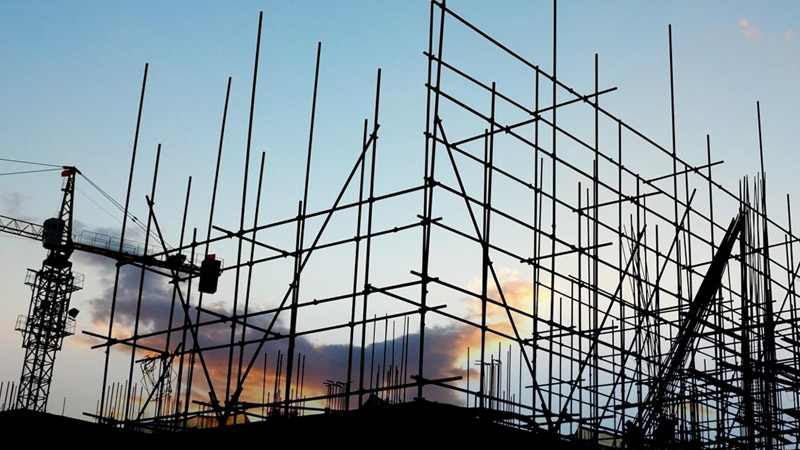Time and date
CONSTRUCTION DIRECTORY
Project ADR Contact Details
Address
Sir John Rogersons Quay , Dublin
EastGate Village, Little Island , Cork
EastGate Village, Little Island , Cork
About Project ADR
Appoint Adjudicator Standing Conciliator Ireland
Billy Morrissey Standing Conciliator Adjudicator Ireland
An Adjudicator trained and accredited by the Chartered Institute of Arbitrators to determine payment disputes under the Construction Contracts Act 2013 (Adjudication based on a Notice of Intention) in Ireland and the Construction Act 1996 in the UK. A Member of the CIF and the CIArb Panel of Adjudicators, having a CIArb Diploma in Construction Adjudication. Based in Tipperary, with offices in Dublin and Cork, he is nominated for Adjudication Referrals or as Standing Conciliator by agreement.
In fact, Billy is dual qualified with a Civil Engineering Degree (UCD) and a Master’s in Construction Law and Arbitration (RGU). As a Fellow of the Chartered Institute of Arbitrators (FCIArb) and a Chartered Member of Engineers Ireland Dispute Resolution Panel, he accepts Appointment as Standing Conciliator / Conciliator and impartial Adjudicator under PWC Contract Cl. 13.2 of PWCF1 to PWCF4 on housing, transportation, infrastructure, and schools / colleges projects and often as Mediator, Conciliator, Project Board Member and Neutral Expert. Indeed, Billy is also a dispute panel member for the Construction Industry Federation, the Mediators Institute of Ireland, Engineers Ireland, and the TII /IFA infrastructure panels. As a Committee Member of the Chartered Institute of Arbitrators, he is responsible for Dispute Avoidance training and the role of Standing Conciliator (PWC contracts), Project Mediator and Project Boards and Dispute Avoidance and Adjudication Boards (DAABs).
He is a neutral CIArb and MMII Accredited Mediator experienced in the resolution of commercial, construction, environmental and community conflicts. With a proven record and easy style in conflict resolution; he gets results. Importantly, with over four decades of unique experience in all aspects of building and engineering, split between being contractor, estimator / specialist - subcontractor and being employer, designer / public authority engineer; he brings confidence and certainty to parties in conflict. He has made numerous Conciliator’s Recommendations and Arbitration Awards. Also, he has been Assessor and / or acted as Mediator in CPO land and property acquisition referrals. Was appointed to review national infrastructure public consultation plans and often facilitates effective project stakeholder engagement, being a CIArb Environmental and Community Mediator.
Contact: billy@projectadr.com Telephone: 087 2890792
Nominate a CIArb Panel Adjudicator| Notice of Intention | Construction Referral
Appoint Standing Conciliator| Public Works Contracts| Schedule Part 1N
William (Billy) Morrissey BE LLM CEng MIEI FCIArb MMII Dip Adj
Billy Morrissey Standing Conciliator Adjudicator Ireland
An Adjudicator trained and accredited by the Chartered Institute of Arbitrators to determine payment disputes under the Construction Contracts Act 2013 (Adjudication based on a Notice of Intention) in Ireland and the Construction Act 1996 in the UK. A Member of the CIF and the CIArb Panel of Adjudicators, having a CIArb Diploma in Construction Adjudication. Based in Tipperary, with offices in Dublin and Cork, he is nominated for Adjudication Referrals or as Standing Conciliator by agreement.
In fact, Billy is dual qualified with a Civil Engineering Degree (UCD) and a Master’s in Construction Law and Arbitration (RGU). As a Fellow of the Chartered Institute of Arbitrators (FCIArb) and a Chartered Member of Engineers Ireland Dispute Resolution Panel, he accepts Appointment as Standing Conciliator / Conciliator and impartial Adjudicator under PWC Contract Cl. 13.2 of PWCF1 to PWCF4 on housing, transportation, infrastructure, and schools / colleges projects and often as Mediator, Conciliator, Project Board Member and Neutral Expert. Indeed, Billy is also a dispute panel member for the Construction Industry Federation, the Mediators Institute of Ireland, Engineers Ireland, and the TII /IFA infrastructure panels. As a Committee Member of the Chartered Institute of Arbitrators, he is responsible for Dispute Avoidance training and the role of Standing Conciliator (PWC contracts), Project Mediator and Project Boards and Dispute Avoidance and Adjudication Boards (DAABs).
He is a neutral CIArb and MMII Accredited Mediator experienced in the resolution of commercial, construction, environmental and community conflicts. With a proven record and easy style in conflict resolution; he gets results. Importantly, with over four decades of unique experience in all aspects of building and engineering, split between being contractor, estimator / specialist - subcontractor and being employer, designer / public authority engineer; he brings confidence and certainty to parties in conflict. He has made numerous Conciliator’s Recommendations and Arbitration Awards. Also, he has been Assessor and / or acted as Mediator in CPO land and property acquisition referrals. Was appointed to review national infrastructure public consultation plans and often facilitates effective project stakeholder engagement, being a CIArb Environmental and Community Mediator.
Contact: billy@projectadr.com Telephone: 087 2890792
Nominate a CIArb Panel Adjudicator| Notice of Intention | Construction Referral
Appoint Standing Conciliator| Public Works Contracts| Schedule Part 1N
William (Billy) Morrissey BE LLM CEng MIEI FCIArb MMII Dip Adj
Gallery
|
Click to close
|
News
29/07/2020
Explanation of Standing Conciliator Role PWC Contracts
In accordance with the Office of Government Procurement and the Capital Works Management Framework, for all contracts carried out using the Irish Public Works Contract Form PW-CF1 to PW-CF4 where the anticipated Contract Sum will be in excess of €10million, a Standing Conciliator must be appointed by the Parties, from the Starting Date until the Parties agree to terminate the Standing Conciliator’s appointment.
For all contracts carried out using Public Works Contract Form PW-CF1 to PW-CF4 where the anticipated Contract Sum will be less than €10million, the Employer will have the option of requiring a Standing Conciliator to be appointed by the Parties, from the Starting Date until the Parties agree to terminate the Standing Conciliator’s appointment. Where a Standing Conciliator is appointed, they shall fulfil the role of the Conciliator in all cases, and the requirement to appoint a conciliator within 10 Working Days of a referral of a dispute to conciliation as set out in sub-clause 13.2 will no longer stand.
The intention behind the introduction of the Standing Conciliator is to promote dispute avoidance and encourage proper engagement between the Parties to assist the Parties in the avoidance of disputes, to assist the Parties in avoidance of costly and lengthy formal dispute resolution procedures, and to assist the Parties to establish agreement upon issues before they crystallise into a dispute.
If a dispute arises, the Standing Conciliator will act as a Conciliator. To ensure the Standing Conciliator can fulfil such a role it is recommended that the Parties should ensure the following:
• the Standing Conciliator shall be issued with a complete set of the Contract Documents upon appointment of the Standing Conciliator.
• the Standing Conciliator shall attend site on regular basis to ensure they have adequate project oversight and to gain standing knowledge of the relationship between the Parties prior to the crystallisation of any disputes
• the Standing Conciliator shall be included on correspondence surrounding clause 4.9, 4.10 and 4.15 from each Party The Parties may agree with the Standing Conciliator to have the Standing Conciliator included on any other correspondence between the Parties under the Contract, or circulated with any amendments to the Works Requirements, Contractor’s Proposals, and or any documents included in the Contract Documents.
The Standing Conciliator should regularly review all correspondence and documentation received from the Parties and confer with the parties where deemed necessary by the Standing Conciliator or requested to do so by the Parties.
Appointment of a Standing Conciliator:
According to the Office of Government Procurement, where a Standing Conciliator is appointed in Ireland on contracts carried out using PWCF1 to PW-CF4, the Standing Conciliator shall take the place of the Conciliator under sub-clause 13.2 of the Contract. In Schedule Part 1N of the Contract, the Employer should confirm that a Standing Conciliator will be required for the Project. This is mandatory on projects with an anticipated Contract Sum in excess of €10million and optional for projects with an anticipated Contract Sum of between €5million and €10million.
Schedule Part 3C of the Contract contains a form field to be in filled with the details of the agreed Standing Conciliator who shall be appointed jointly by the Parties to the Contract prior to the Starting Date. This form field is not to be filled in until after agreement is reached on the appointment of the Standing Conciliator. Schedule Part 1N contains an additional form field to be in filled, prior to the Employer issuing tender documents to all tenderers, with the name of the person or body to appoint the Standing Conciliator where the Parties cannot agree.
Standing Conciliator to act as Conciliator:
According to the CWMF, where a dispute is referred to conciliation under sub-clause 13.2, the Standing Conciliator is to fulfil the role of conciliator under sub-clause 13.2 of the Contract. If the dispute is not resolved by agreement within 42 calendar days after the dispute is referred to conciliation under sub-clause 13.2, or a longer period proposed by the Standing Conciliator and agreed by the Parties, the Standing Conciliator shall give both Parties a written recommendation. The Standing Conciliator shall base the recommendation on the Parties’ rights and obligations under the Contract.
The conciliation process under the Standing Conciliator is to run as per the process defined under sub-clause 13.2 of the Contract with the following exceptions:
• There is no requirement to agree an appointment of a conciliator following referral.
• The conciliation process should commence immediately following referral.
• The Parties may agree to have the Standing Conciliator hold regular interval meetings to hear disputes referred to conciliation in bundles.
Relationship between the Standing Conciliator
For all contracts carried out using Public Works Contract Form PW-CF1 to PW-CF4 where the anticipated Contract Sum will be less than €10million, the Employer will have the option of requiring a Standing Conciliator to be appointed by the Parties, from the Starting Date until the Parties agree to terminate the Standing Conciliator’s appointment. Where a Standing Conciliator is appointed, they shall fulfil the role of the Conciliator in all cases, and the requirement to appoint a conciliator within 10 Working Days of a referral of a dispute to conciliation as set out in sub-clause 13.2 will no longer stand.
The intention behind the introduction of the Standing Conciliator is to promote dispute avoidance and encourage proper engagement between the Parties to assist the Parties in the avoidance of disputes, to assist the Parties in avoidance of costly and lengthy formal dispute resolution procedures, and to assist the Parties to establish agreement upon issues before they crystallise into a dispute.
If a dispute arises, the Standing Conciliator will act as a Conciliator. To ensure the Standing Conciliator can fulfil such a role it is recommended that the Parties should ensure the following:
• the Standing Conciliator shall be issued with a complete set of the Contract Documents upon appointment of the Standing Conciliator.
• the Standing Conciliator shall attend site on regular basis to ensure they have adequate project oversight and to gain standing knowledge of the relationship between the Parties prior to the crystallisation of any disputes
• the Standing Conciliator shall be included on correspondence surrounding clause 4.9, 4.10 and 4.15 from each Party The Parties may agree with the Standing Conciliator to have the Standing Conciliator included on any other correspondence between the Parties under the Contract, or circulated with any amendments to the Works Requirements, Contractor’s Proposals, and or any documents included in the Contract Documents.
The Standing Conciliator should regularly review all correspondence and documentation received from the Parties and confer with the parties where deemed necessary by the Standing Conciliator or requested to do so by the Parties.
Appointment of a Standing Conciliator:
According to the Office of Government Procurement, where a Standing Conciliator is appointed in Ireland on contracts carried out using PWCF1 to PW-CF4, the Standing Conciliator shall take the place of the Conciliator under sub-clause 13.2 of the Contract. In Schedule Part 1N of the Contract, the Employer should confirm that a Standing Conciliator will be required for the Project. This is mandatory on projects with an anticipated Contract Sum in excess of €10million and optional for projects with an anticipated Contract Sum of between €5million and €10million.
Schedule Part 3C of the Contract contains a form field to be in filled with the details of the agreed Standing Conciliator who shall be appointed jointly by the Parties to the Contract prior to the Starting Date. This form field is not to be filled in until after agreement is reached on the appointment of the Standing Conciliator. Schedule Part 1N contains an additional form field to be in filled, prior to the Employer issuing tender documents to all tenderers, with the name of the person or body to appoint the Standing Conciliator where the Parties cannot agree.
Standing Conciliator to act as Conciliator:
According to the CWMF, where a dispute is referred to conciliation under sub-clause 13.2, the Standing Conciliator is to fulfil the role of conciliator under sub-clause 13.2 of the Contract. If the dispute is not resolved by agreement within 42 calendar days after the dispute is referred to conciliation under sub-clause 13.2, or a longer period proposed by the Standing Conciliator and agreed by the Parties, the Standing Conciliator shall give both Parties a written recommendation. The Standing Conciliator shall base the recommendation on the Parties’ rights and obligations under the Contract.
The conciliation process under the Standing Conciliator is to run as per the process defined under sub-clause 13.2 of the Contract with the following exceptions:
• There is no requirement to agree an appointment of a conciliator following referral.
• The conciliation process should commence immediately following referral.
• The Parties may agree to have the Standing Conciliator hold regular interval meetings to hear disputes referred to conciliation in bundles.
Relationship between the Standing Conciliator
29/07/2020
Explanation of Adjudication Construction Contracts Act 2013
Explanation of the Role of Adjudicator and The Construction Contracts Act 2013
The Act was enacted on the 29th July 2013 in Ireland and was signed into force on 25th July 2016. The purpose of the Act is to ‘regulate payments under construction contracts and to provide for related matters.’ The Act is made up of twelve sections and a Schedule. The Sections are: 1) Interpretation; 2) Construction contracts; 3) Payments under construction contracts; 4) Payment Claim Notices; 5) Right to suspend work for non-payment; 6) Right to refer payment disputes to adjudication; 7) Right to suspend work for failure to comply with adjudicator’s decision; 8 ) Selection of panel of adjudicators; 9) Code of practice for adjudication; 10) Delivery of notices; 11) Expenses; and, 12) Short title and commencement. The Act is available on www.irishstatutebook.ie.
The Act introduced Adjudication as a dispute resolution procedure for construction projects in Ireland. Parties to construction contracts can refer any payment dispute to adjudication at ‘any time’.
The following contracts are excluded from Adjudication according to the Act:
• contracts valued at less than €10,000.
• contracts relating to owner-occupied residential dwellings of less than 200sq metres - adjudication on payment disputes will be available if the property is large enough.
• contracts for employment; and
• contracts between a state authority and its partner in a public private partnership arrangement.
Referring a Payment Dispute to Adjudication:
A party can initiate the Adjudication process by issuing a Notice of intention to Refer the Dispute to Adjudication. The Notice of Intention is important as it defines the Adjudication and the Adjudicator derives his/her jurisdiction from the Notice. After issuing the Notice of Intention the employer and contractor or contractor and subcontractor as the case may be, has 5 days normally in which to agree the appointment of an Adjudicator or the appointment can referred to the Chair of the Construction Contracts Adjudication Panel where the parties have no control over the appointment. There is no set time frame in Ireland for the appointment of the Adjudicator, unlike in the UK.
Following confirmation of the Adjudicator's appointment, the party who is referring the dispute to Adjudication has 7 days in which to serve it’s Referral Notice setting out its Claim in detail usually accompanied by supporting documents together with any reports and witness statements.
Quite often at the outset of adjudications there may be threshold jurisdictional challenges from the Responding party with regard to such matters as to the matter being allowed under the Act, the existence of a dispute and other such objections ,all of which have to dealt with by the Adjudicator. It is normally a fast moving and intensive process for all parties involved and their agents/ advisers on both sides.
Conduct of Adjudication CCA13
Adjudicators are required according to the Act to adhere to the Code of Practice. The Code stipulates that Adjudicators must be "impartial, independent and only adjudicate where satisfied that no actual conflict of interest exists. He / she shall observe the principles of procedural fairness, which shall include giving each party a reasonable opportunity to put their case and to respond to the other party’s case."
Enforcement of an Adjudicator's decision
According to the Act, the Adjudicator must Make a Decision with 28 days of the Referral, but this can be extended by agreement with the parties.
An Adjudicator's Decision is temporarily binding on the parties until the matter is finally settled.
Right to Suspension of Work:
If an Adjudicator makes a monetary award decision and the sum is not paid within seven days, the party to which the sum is owed has a right to suspend work by giving notice to the other party. Work can be suspended until either:
• payment of the amount due is made; or
• the Decision of the Adjudicator is referred to Arbitration or Litigation.
A party to an Adjudication may apply to the High Court to Enforce a Decision under a Statutory Instrument that came into operation on 22 August 2016.
The Act was enacted on the 29th July 2013 in Ireland and was signed into force on 25th July 2016. The purpose of the Act is to ‘regulate payments under construction contracts and to provide for related matters.’ The Act is made up of twelve sections and a Schedule. The Sections are: 1) Interpretation; 2) Construction contracts; 3) Payments under construction contracts; 4) Payment Claim Notices; 5) Right to suspend work for non-payment; 6) Right to refer payment disputes to adjudication; 7) Right to suspend work for failure to comply with adjudicator’s decision; 8 ) Selection of panel of adjudicators; 9) Code of practice for adjudication; 10) Delivery of notices; 11) Expenses; and, 12) Short title and commencement. The Act is available on www.irishstatutebook.ie.
The Act introduced Adjudication as a dispute resolution procedure for construction projects in Ireland. Parties to construction contracts can refer any payment dispute to adjudication at ‘any time’.
The following contracts are excluded from Adjudication according to the Act:
• contracts valued at less than €10,000.
• contracts relating to owner-occupied residential dwellings of less than 200sq metres - adjudication on payment disputes will be available if the property is large enough.
• contracts for employment; and
• contracts between a state authority and its partner in a public private partnership arrangement.
Referring a Payment Dispute to Adjudication:
A party can initiate the Adjudication process by issuing a Notice of intention to Refer the Dispute to Adjudication. The Notice of Intention is important as it defines the Adjudication and the Adjudicator derives his/her jurisdiction from the Notice. After issuing the Notice of Intention the employer and contractor or contractor and subcontractor as the case may be, has 5 days normally in which to agree the appointment of an Adjudicator or the appointment can referred to the Chair of the Construction Contracts Adjudication Panel where the parties have no control over the appointment. There is no set time frame in Ireland for the appointment of the Adjudicator, unlike in the UK.
Following confirmation of the Adjudicator's appointment, the party who is referring the dispute to Adjudication has 7 days in which to serve it’s Referral Notice setting out its Claim in detail usually accompanied by supporting documents together with any reports and witness statements.
Quite often at the outset of adjudications there may be threshold jurisdictional challenges from the Responding party with regard to such matters as to the matter being allowed under the Act, the existence of a dispute and other such objections ,all of which have to dealt with by the Adjudicator. It is normally a fast moving and intensive process for all parties involved and their agents/ advisers on both sides.
Conduct of Adjudication CCA13
Adjudicators are required according to the Act to adhere to the Code of Practice. The Code stipulates that Adjudicators must be "impartial, independent and only adjudicate where satisfied that no actual conflict of interest exists. He / she shall observe the principles of procedural fairness, which shall include giving each party a reasonable opportunity to put their case and to respond to the other party’s case."
Enforcement of an Adjudicator's decision
According to the Act, the Adjudicator must Make a Decision with 28 days of the Referral, but this can be extended by agreement with the parties.
An Adjudicator's Decision is temporarily binding on the parties until the matter is finally settled.
Right to Suspension of Work:
If an Adjudicator makes a monetary award decision and the sum is not paid within seven days, the party to which the sum is owed has a right to suspend work by giving notice to the other party. Work can be suspended until either:
• payment of the amount due is made; or
• the Decision of the Adjudicator is referred to Arbitration or Litigation.
A party to an Adjudication may apply to the High Court to Enforce a Decision under a Statutory Instrument that came into operation on 22 August 2016.
Products & Services
Mediator Commercial Disputes
Standing Conciliator Public Works Contracts Ireland
Adjudication per Construction Contracts Act 2013
Team
| Name | Role | Telephone | |
| Billy Morrissey | Adjudicator & Standing Conciliator Ireland CIArb , EI , CIF | billy@projectadr.com | +353872890792 |
| Billy Morrissey | Adjudicator & Standing Conciliator Ireland CIArb , EI , CIF | billy@projectadr.com | +353872890792 |





















